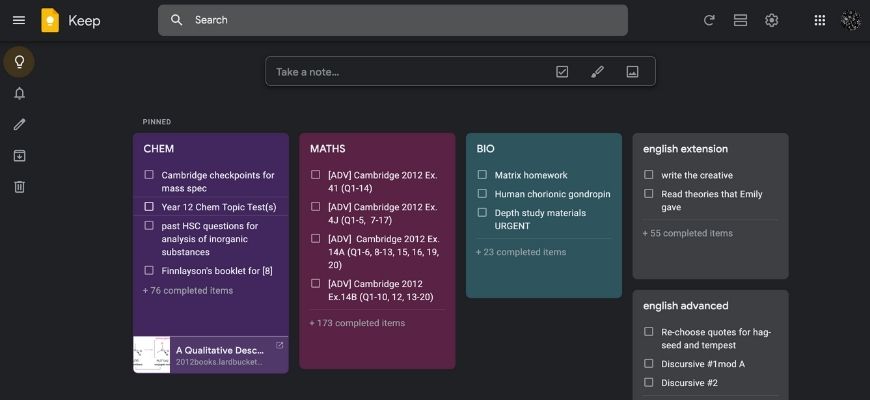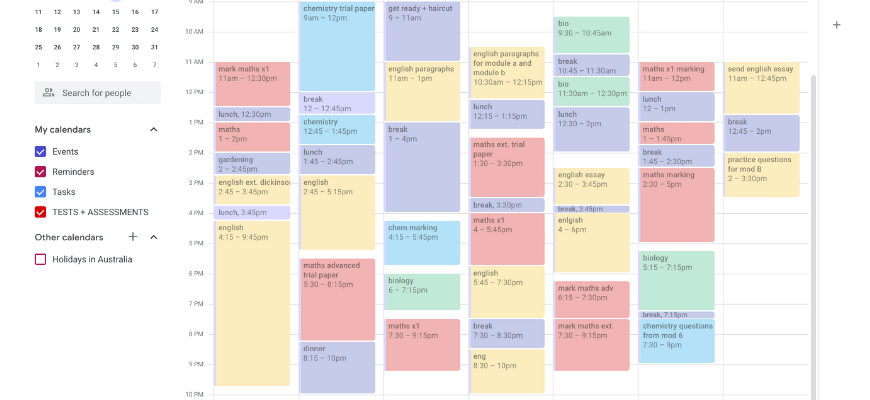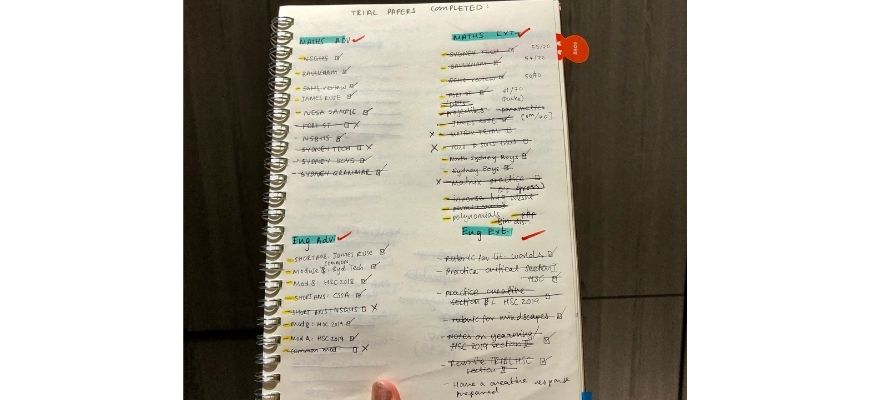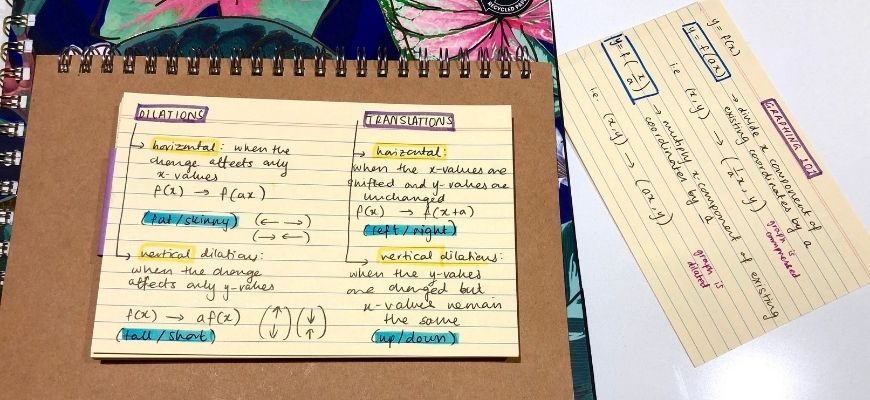Year 12 Common Module Study Guides
Learning methods available
Select a year to see available courses
Are you finding the HSC stressful? Are you lacking motivation? Well, in this article, Sunny shares some useful advice that helped her beat her anxieties, stresses and lack of motivation.

Join 75,893 students who already have a head start.
"*" indicates required fields
You might also like
We know that the final 2 years of High School can get super intimidating and stressful. So, in this article, Sydney Girls and Matrix graduate, Sunny, shares her best advice on how she beat her HSC anxieties, stress and lack of motivation.
Hi! My name is Sanskriti Sharma (or just Sunny) and I’ve recently completed Year 12 at Sydney Girls High School.
Right off the bat, I’ve never been naturally ‘gifted’ in my studies. I was a fairly average student throughout primary school, and started at that level my early high school years too.
I honestly still believe that I have great room for improvement.
Unknowingly, however, I picked up on some attributes throughout my high school life that made me improve little by little every single year.
The progress I’ve seen in myself make as a learner has been incredible!
It all really comes down to some simple attitudes – such as how we respond to our subject’s content – that can make all the difference!
I have a special place for medicine in my heart as I’ve always been fascinated with the intricacy of all living things, especially us humans!
I also really love helping out in general. I’ve personally felt sickeningly helpless in medical emergencies.
So, by studying to become a doctor, I can hopefully know how to respond meaningfully in such situations, both in and outside of work.
And this is for two main reasons:
Firstly, it was a subject where I had some amazing teachers (both at Matrix and school) that explained the content really well and provided great resources.
Secondly, it was always (or at most times) engaging as it positioned me to perceive the world in a way I didn’t even know I could!
We learned about how soaps work, why water takes so darn long to boil, and I even found out why gas cylinders don’t have edges! (Gas accumulates in corners. So, to minimise pressure we create cylinders that mimic the shape of a sphere – the most corner-less shape!)
So, for me, it’s a subject filled with constant surprises. It helps me notice overlooked simplicities in an exciting new light (which honestly, is probably true for all science subjects).
My understanding and knowledge of Maths Extension 1 was not the problem…
It was the combination of me being flustered by complicated-looking questions in exams and making silly mistakes here and there.
This made my results much worse than they could’ve been!
In hindsight, better exam technique would have certainly helped me do better in this subject.
Shoutout to my Matrix Maths teacher, Hugh, for really helping me understand Maths way better!
There were a couple of challenges I found myself struggling with here and there, including:
And of course, the pandemic worsened these challenges. I like many others, could not participate in extracurriculars and other activities that balanced out my academics, such as vocal ensemble and drama.
Online-schooling also blurred the lines between classwork and homework for me, requiring a lot more independent learning and discipline from my part, which was quite mentally exhausting at times.
Struggling to find support while studying for the HSC? Not too sure how to manage your workload?
At Matrix, the HSC experts will help guide you, so that you feel motivated to keep pushing forward! Request a free trial lesson now.
How I beat my HSC anxieties, lack of motivation and stress:
My teachers often describe me as self-motivated, and I guess I am… most of the time.
Whenever I struggled to stay motivated, I made a mental (or even physical) list of all the people that were rooting for me: family and teachers.
While too much external pressure to do well can be damaging, a small push can really motivate you to keep working. Think about everyone you want to make proud!
Alternatively, if you’re a bit dramatic like me, you can imagine you’re on reality TV.
Isn’t it a bit weird if you’re scrolling through Instagram on your study desk for hours on end while the whole nation watches you?
Fear of mass judgement really works, y’all.
1. Make lists!
I did this on Google Keep or in my personal notebook.
You can make a separate list for each subject and then roughly assign some time for each. I used Google Calendar for this.
This really helped me calm down whenever I felt like I was swamped with work.
Protip: During your exam block, I suggest writing your next day’s tasks before you go to bed. This will prevent you from being distracted when you wake up the next day!


2. Prioritise tasks
Also, judiciously choose which tasks you need to prioritise, and which ones you can complete later.
Making this judgement can be difficult at first, but you get better with practice.
3. Take breaks
Finally, take regular breaks.
Funny thing is, I resisted taking breaks whenever I was ‘in the mood’ to study. However, studying for long periods of time deteriorates your focus and concentration.
Just take a 10 minute stretching break between every hour or so of sitting. It always helps!

Whenever I was scared of an upcoming exam or my overall HSC result (which, in hindsight, was quite often), I remembered that all I can physically do is try my best.
Besides luck, there was absolutely nothing else that could change the outcome of my HSC.
My mum also drilled this Sanskrit quote into my head. It roughly translates in English to:
“Just keep working, and don’t worry about the results. Whatever work you do, the results will find themselves…”
It’s a bit dry after translation but it simply goes to say, all you can do right now is focus on the task at hand. Don’t let the outcome distract you!
And finally, to help with my lack of extracurriculars and the stresses of online learning, I took advantage of video/audio chatting software as much as I could!
Often we’d make little online study channels on Discord where people could come and go anytime, ask questions, revise together, and motivate each other to not procrastinate.
This was quite helpful. So, I found myself using this even after lockdown ended.
I’ve discussed some good habits already, but here is how I generally prepared for exams:
I attended Matrix Term Courses for Chemistry, and Holiday Courses for Biology, wherein I tried to stay focused and just understand the content.
I tried my best to complete all the Matrix homework or at least catch up on it before upcoming exams.
I did this by marking each question in detail (and quite harshly!) right after I finished writing the solution for it.
While this wasn’t the most time-efficient method, it certainly helped me!
I learned the content, as well as how to better address the requirements of a question. This is especially helpful for someone like me who tends to beat around the bush!
I also kept a copy of difficult questions for each subject, as well as their solutions. I’d try and flick through this booklet a day before an exam to refresh my memory.
For concepts that I couldn’t easily wrap my head around, I made flowcharts and drew diagrams. I even made some notes on palm cards, which really helped me remember things like Maths equations.
This allowed me to organise information in a way that I could easily recall. This was especially helpful as I realised that I’m a visual learner – you can test this out yourself!
The next time you recall something, do you imagine it visually? Or do you perhaps remember the words you read in a textbook?
Often it’s a combination of both, but you can optimise your learning by knowing which method you rely on more.
The following are some pictures of my Biology and Maths diagrams (note that I have chosen only the neatest ones to share with you).


Finally, I attempted any reliable past papers or questions I could get my hands on.
This includes questions from textbooks, worksheets, Matrix additional questions, etc.
I completed both timed and untimed practice!
Pro tip: Make sure you familiarise yourself with NESA’s glossary of terms. The verbs they use in the questions can drastically change the type of answer you are supposed to write.
(Editor’s note: In our article, How to Respond to NESA Key Words, we go through the definitions of all NESA key words and show you how to respond to it with a step-by-step process!)
I really hated doing timed practices, especially for English essays.
I spent my time writing topic sentences instead of writing full essay responses under timed conditions.
So, I regret not completing more timed essays.
It would have helped me write more polished responses during exams, as well as completing my essays faster.
This helps you identify what you could’ve done better. Essentially, just continue to improve.
It might be tiring, but it is a great way to make progress.
Prioritise learning and understanding content rather than rote-learning it.
This is especially useful in Maths. You can derive formulas that are not on the data sheet provided if you understand the Mathematical reasoning employed.
Help your friends by teaching them, or be helped by your friends when you don’t understand a concept!
Collaboration is an excellent way to learn!
Being selfish about your knowledge or study notes is unhelpful, especially in an HSC setting, which demands teamwork from your entire cohort.
Don’t give up, whether it’s in the long term (like keeping up with homework throughout the school year) or in the short term (like feeling lost in a tricky exam that you just can’t get your head around *cough cough, 2020 HSC Chemistry*).
Take a deep breath, improvise, remind yourself: “You can do it!”
Just keep going!
Having minimal extracurriculars gives the illusion of having more time to study.
However, in reality, we take our extra time for granted and end up wasting a lot of it…
We could’ve been reaping the benefits of meeting new people and taking a breather from our otherwise hectic lives.
I reiterate, don’t drop extracurriculars that you enjoy!
Finally, try not to compare yourself to others.
In a system that’s literally based on relative performance, it’s difficult not to compare yourself to your peers.
However, I assure you, comparing your achievements with someone else’s can quickly become toxic.
Going to a school with such bright young women, it was hard for myself to not feel like an imposter sometimes. But, you see, there are two ways of looking at it. You can either be genuinely inspired by someone’s habits or be jealous of them. How you see the world is totally in your hands!
We all have different ways of studying. So, if we keep comparing ourselves, we will never be satisfied with our achievements or personal methods, no matter how wonderful they are.
Incorporate some good habits of your peers into your own routine? Why not! But we all have separate ways of studying and if we keep comparing ourselves, we will never be satisfied with our achievements or personal methods, no matter how wonderful they are.
Written by Guest Author
We have regular contributions to our blog from our Tutor Team and high performing Matrix Students. Come back regularly for these guest posts to learn their study hacks and insights!© Matrix Education and www.matrix.edu.au, 2023. Unauthorised use and/or duplication of this material without express and written permission from this site’s author and/or owner is strictly prohibited. Excerpts and links may be used, provided that full and clear credit is given to Matrix Education and www.matrix.edu.au with appropriate and specific direction to the original content.